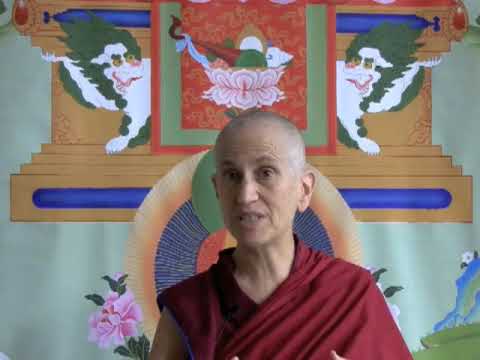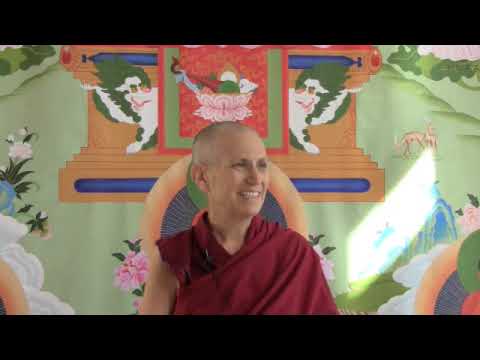Non-revelatory forms and vows
Part of a series of Bodhisattva's Breakfast Corner talks on the Stages of the Path (or lamrim) as described in the Guru Puja text by Panchen Lama I Lobsang Chokyi Gyaltsen.
- Vow
- Non-vow
- Other
We were talking about karma yesterday in terms of revelatory and non-revelatory forms, revelatory forms being the shape of the body or the sound of the voice, which is the actual verbal or physical action, and then we talked about vows being one type of non-revelatory form. There are different types, and vows are one type. Here the non-revelatory form is a subtle form of matter or of material of form that is not perceptible to the the eye, for example, and it’s not obstructable, doesn’t take up space. When you take a vow you receive a non-revelatory form by the force of your determination to keep that vow.
In the context of vows and non-revelatory forms, they talk about three kinds. There’s a vow, what they call a non-vow (I’ll explain what that means), and then there’s one, a category of “other.” I know this is very clear.
The vows are, for example, when you take the pratimoksha vows, then what they call the precept body. You receive this non-revelatory form that acts like a dam that keeps you from doing what you’ve decided you don’t want to do. To not kill, to not lie, these physical and verbal actions that are related with the pratimoksha vows. With the bodhisattva vows and the tantric vows it’s a different thing. They don’t talk about non-revelatory form there, just with the pratimoksha: the monastic vows and five lay precepts.
The non-vow is when you make a very strong determination, but it’s to do something non-virtuous. It’s a vow of sorts, but it’s a non-virtuous vow. It might be somebody, for example, who’s decided to be a butcher during their life, or somebody who’s decided to fight and kill the enemy over a long period of time. You’ve made a decision about some physical or verbal action that you’re going to do that’s non-virtuous. When you make that decision you get this non-revelatory form.
The third kind of non-revelatory form is the “other” category. This is when you construct a holy object with the intention of people creating merit in relationship to it. For example, if you build a monastery, if you build a stupa, if you offer food to the sangha, these are the things that are listed in the Abhidharma. There are seven in particular, I can’t remember all of them, this kind of thing where you build some kind of form or make some kind of offering to holy beings and then whenever people are using that you accumulate merit by this non-revelatory form. For example, if you offer a monastery, even you’re away doing something else, when people are using that and using it to create virtue, then you receive good karma because of this non-revelatory form that you have which arose due to your determination to make this offering of a holy object. They say that’s why it’s so good to make these kinds of offerings, because then from now until you die, whenever somebody’s using it and benefiting from it you get some good karma from it, so it’s quite powerful.
Then there’s another way in which non-revelatory forms come into karma and that is when you tell somebody to do a certain action. If I tell somebody to do either a virtuous physical or verbal action or a non-virtuous physical or verbal action, when they follow my instructions and do it, I accumulate at that moment a non-revelatory form. The reason why they say that the person who gives the instruction accumulates a non-revelatory form is because, let’s say I tell somebody to do something non-virtuous but at the time they do it my mind is in a virtuous or a neutral state, then how would I accumulate the karma? The way you accumulate the karma is you receive this non-virtuous non-revelatory form. Or in the same way if I instructed somebody to do something virtuous and at the time they did it my mind was non-virtuous or neutral, the way I accumulate the karma is by receiving this non-revelatory form at the time.
Now the non-revelatory forms, whether this kind that you receive by instructing somebody to do an action or a vow or a non-vow, these last only as long as your gross physical body lasts, and at the time of death they’re lost That’s why when you ordain, let’s say as a monk or nun or you take the five precepts, you always say “from now until the end of my life” because at the end of your life you automatically lose the precept body, that non-revelatory form. You have to retake the pratimoksha vows again in the next life, but the karma is passed down because there is a disintegratedness of the non-revelatory form that you got. That’s how the karma is passed on in the mindstream. The mindstream can’t carry with it either a revelatory or a non-revelatory form. It’s just the disintegratedness of that form that is carried by the mindstream. That is what connects the cause to the result in the future life.
Audience: Venerable what about people who join the army and then with the understanding that “I’m fighting for my country,” in that case, if you go to a war for the country, what kind of karma?
Venerable Thubten Chodron (VTC): If you join the army, you have the idea “I’m serving my country,” but you also will have the idea that we have to kill the people that are against our country. So if you join any group voluntarily and you’re agreeing with the purpose of that group, then whenever anybody in that group performs that purpose, you get some karma from it. So that’s why we have to be very careful what groups we join and what our mind is thinking about when we join them. For example, this non-revelatory form is how, let’s say, a general in a war who’s sitting in his office but tells the soldiers to go out and kill, he accumulates the karma of killing of all the people he’s instructed to kill.
Audience: The soldier that obeys the command also accumulates?
VTC: Also accumulates. The one who does the actual killing also accumulates. Now of course there’s going to be a difference if let’s say you are being held at gunpoint and being forced to kill. There’s a difference in the karma between that and somebody who is going to, voluntarily going, to kill because when you’re being forced with the threat of your own life, it’s on one level; you just don’t have the motivation to kill on the other level you do because you’re forced to. So the karma accumulated is different. It’s kind of like if somebody’s forcing you to do something virtuous vs if you’re choosing to.
Audience: If someone ask you, like you said, instructs you to do a virtuous deed and the person who has been instructed to do the virtuous deed may not like it, right, but he or she did it anyway.
VTC: If somebody instructs somebody else to do a virtuous deed and that other person really isn’t very hot on it, they don’t really want to do it. Let’s say I tell somebody to please, they’re going to Bodhgaya, and I say, “Please make an offering at the stupa at Bodhgaya for me,” and I give them something to offer and they go and they’re just like, “Oh well I’m not even a Buddhist, what’s this about, here’s the offering,” I get some virtuous karma because in the form of this non-revelatory form when they give that. They get some good karma too by the power of the holy object, but not by the power of their motivation because they didn’t really have a virtuous motivation. They had kind of a neutral motivation
Venerable Thubten Chodron
Venerable Chodron emphasizes the practical application of Buddha’s teachings in our daily lives and is especially skilled at explaining them in ways easily understood and practiced by Westerners. She is well known for her warm, humorous, and lucid teachings. She was ordained as a Buddhist nun in 1977 by Kyabje Ling Rinpoche in Dharamsala, India, and in 1986 she received bhikshuni (full) ordination in Taiwan. Read her full bio.


